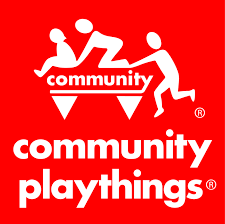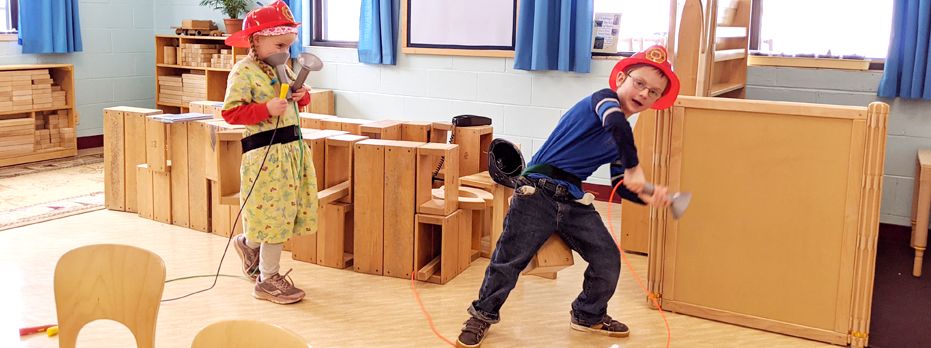Learning Through Play
| May 2009In our hurried and hurrying society, we have come to think of play as a luxury at best and a waste of precious time at worst. From our adult perspective, we often associate play with fun and relaxation in contrast to the attention and effort required of us by work. All too often, however, we mistakenly project our grown-up conception of play onto the play of children. Yet for children in general, and for young children in particular, self-initiated play is a basic mode of learning. Through such play, children create new learning experiences that they might not otherwise encounter. A few examples may help to illustrate this mode of learning.
Perhaps the clearest evidence for the role of play in the learning of young children comes from their babbling. No one teaches an infant to babble and all infants all over the world babble. In the course of babbling, children create all of the language sounds they need to speak any of the thousands of extant languages. As infants mature, they progressively select, from the sounds they themselves have created, those that best map onto the sounds of the language of their caregivers. If they never babbled, infants would never learn to speak.
A few other examples may help to give a broader picture of this kind of learning. An infant who drops a rattle over the side of his or her crib discovers gravity. Likewise, an infant who puts everything he or she can grasp, into the mouth discovers that some things are hard, some soft, and some taste just awful. Once children are sitting up in a highchair, they make everything they grasp into an object to be banged. In so doing they discover that wooden spoons make one kind of sound, metal spoons another, and plastic spoons still another. In all of these examples it is the infant’s own self-initiated activities that create new learning experiences.
We see the same type of self-created learning at older age levels as well. Two and three-year-olds may often repeat the same activity over and over again. It may be pouring water over a water wheel to watch it turn, or building a tower with blocks, knocking it over and rebuilding it. This repetition is boring for us adults, as is reading children the same story over and over again. But for the young child, who is less world-savvy, or less world-weary, than we are, each repetition produces something new that the child did not see as a result of the previous action. We adults may not be able to figure out what the child is discovering through repetition, but the child knows very well what he or she has learned.
Four and five year old children who initiate their own dramatic play are also creating new learning experiences. In playing doctor, or teacher, or fireman, etc., the child is really not preparing to engage in these occupations as an adult. Rather, in taking on these roles, the child creates the feeling of omnipotence and power that he or she attributes to adults. Children are little people who are at the mercy of huge grown-ups. By creating the experience of being big like us, of having adult-like powers, children deal with the feeling of powerlessness at being at the mercy of us giants. As this illustration makes clear, play can also be a means of stress reduction for children.
School-age children learn through self-created learning experiences as well. When children make and break their own rules when playing a game like hide and seek they learn mutual respect. That is, they learn to obey the rules that other children make, and expect other children to follow the rules that they have set down. In addition, while playing a board game such as checkers, or Monopoly, children not only learn strategies, but also how to read the body language of the other players. That is to say, each time one player makes a move this brings a reaction (a new learning experience) from the other players in the game.
Accordingly, we have to rethink our ideas of play and learning. Psychologists define learning as “the modification of behavior as the result of experience.” But play can be defined as “the modification of experience as the result of behavior.” Put differently, experience is not always independent of our behavior, but rather can be created by it. As illustrated above, children learn from their self-created experiences as well as those that are independent of their activity.
For parents, this means we have to rethink our attitudes towards self-initiated play. All too many of us believe even young children should be working, learning to read, and doing arithmetic, and perhaps a few beginning computer skills. While it is important for children to learn these tool skills, it is equally important that they learn all of the things they can only learn from their self-created experiences. In many cases such learning provides the foundation for academic learning. A child building with blocks, for example, is learning both classifying (all blocks are made of wood) and seriating (blocks can be ordered by size). This play prepares children for learning cardinal (one, two, three) and ordinal (1st, 2nd, 3rd) numbers.
The importance of self-initiated play, particularly for young children means that we need to give them the time and the open ended toys, like blocks, clay, and form boards that will give children the opportunity to create their own learning experiences. We can encourage this kind of play even when children have play dates. For such interactions we need to provide children with a number of play options, but let them decide which play, and for how long they will engage in it.
There are also ways we parents can initiate activities that encourage our children to “think outside the box.” These are word games we can play in the course of our everyday activities that are not only fun for us and our children, but also encourage curiosity, creativity, and imagination:
- Ask a child to think of as many things as he or she can think of that you can do with a paper clip, pencil, or napkin.
- When riding in the car, play games like finding how many houses have For Sale signs, front porches, or identify particular car models that you see passing by.
- After watching a TV program together, talk about the story and characters, what did you like and not like about them.
- Watch some ads on TV and criticize them.
- Make up new endings to stories you have just read.
Self-created play for children is neither a luxury nor a waste of time, it is a basic mode of learning, and children have a need to play. Accordingly, we cannot really prevent children from engaging in such play. But we can limit the time and opportunities available for such activity. As I have argued here, that would be a mistake particularly for young children. Although it is counterintuitive, the more children learn from their own play when they are young, the better prepared they are to learn from academic instruction when they are older.







